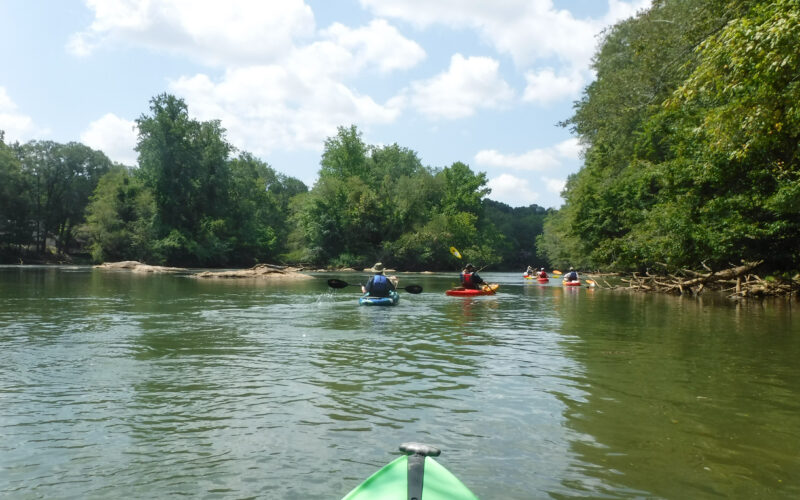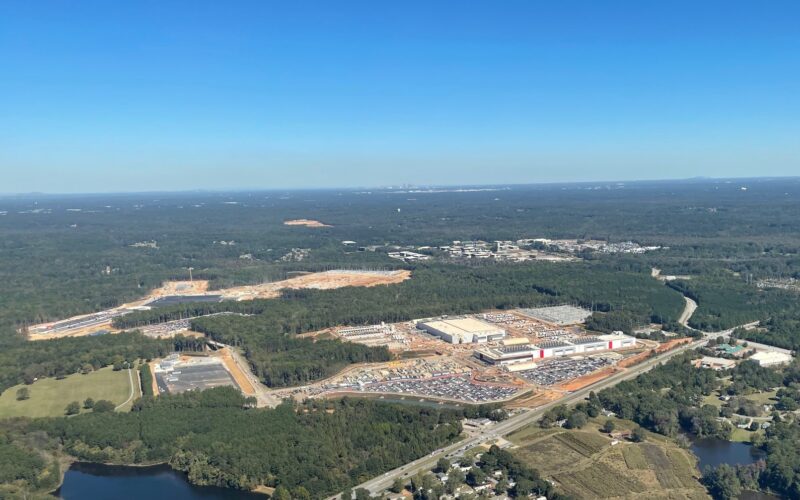Updated September 6, 2024: Chattahoochee Riverkeeper (CRK) has filed a federal lawsuit against the City of Atlanta for its ongoing pollution of the Chattahoochee River. Since at least January 2023, the city’s R.M. Clayton Water Reclamation Center – Atlanta’s largest wastewater treatment facility – has illegally discharged pollutants including nutrients and harmful levels of bacteria into the Chattahoochee River, violating both its wastewater discharge permit and the Clean Water Act.
While the city has outlined its plans to fix issues at the wastewater treatment plant, CRK does not believe they are moving fast enough to address immediate threats posed to the Chattahoochee River.
Water samples collected by CRK at the facility’s outfall and downstream since March 2024 have detected spikes in harmful bacteria levels, which can pose serious health risks for the young, elderly, and immunocompromised. Due to the elevated risk of bacteria exposure while the facility is not functioning properly, CRK advises that river recreators exercise caution for a 60-mile stretch of the river from the plant’s outfall in Atlanta to Franklin, GA.
CRK continues to regularly monitor bacteria and nutrient levels at R.M. Clayton’s outfall and downstream. We always advise people to avoid river recreation for 72 hours after it rains when the river is high and muddy. CRK publishes water quality data from throughout the Chattahoochee River watershed online aquí.
NOTE: This issue does not impact water quality upstream of the plant in the Chattahoochee River National Recreation Area. Check bacterialert.org for real-time bacteria estimates within the park.
Water quality is generally very good in metro Atlanta and the Chattahoochee River. However, this was the second failure at a major wastewater treatment plant in metro Atlanta in less than a year. In the summer of 2023, a failure at the Big Creek Water Reclamation Facility in Fulton County sent millions of gallons of undertreated sewage into the river upstream of the Chattahoochee River National Recreation Area every day for weeks, resulting in a three-week closure of the river park to protect public health.
What is causing the elevated bacteria levels?
During routine river monitoring, CRK detected high bacteria levels in the Chattahoochee in metro Atlanta and tracked the source to the City of Atlanta’s R.M. Clayton facility. Daily testing between March 4 and March 15 showed dangerously high levels of E. coli bacteria in the Chattahoochee River at the plant’s outfall, immediately downstream of the Marietta Boulevard/Atlanta Road bridge. During this period, tests indicated that E. coli levels were an average of 340 times higher than the amount recommended by the U.S. Environmental Protection Agency for safe water recreation.
On March 5, CRK notified the City of Atlanta Department of Watershed Management (DWM) and the Georgia Environmental Protection Division (EPD) about our results. We corresponded with the City of Atlanta DWM and they indicated that equipment failures at the facility were likely the cause. An inspection report by EPD revealed issues at all stages of treatment.
Since then, water samples collected by CRK at the facility’s outfall and downstream have detected spikes in harmful bacteria levels. You can view water quality data from more than 200 sites throughout the watershed on our website.
What caused the R.M. Clayton plant to fail?
We do not know exactly what caused the R.M. Clayton WRC failure. The City of Atlanta DWM has cited heavy rain events in January and February, which caused the secondary clarifiers at the facility to stop functioning properly, but EPD’s inspection report indicates larger operational and maintenance issues.
This problem is unlike other issues we often see during heavy rains, where water seeps into cracks in the sewer pipes (that run from homes and businesses to wastewater treatment plants) and causes them to overflow into nearby streams. This event is different because the failure happened at the facility where the treatment should occur.
los latest inspections conducted by the U.S. Environmental Protection Agency and Georgia Environmental Protection Division show ongoing maintenance and operational problems at R.M. Clayton.
Do undertreated wastewater discharges pose a risk to public health?
Yes. High bacteria levels pose serious risks to public health, especially for vulnerable populations such as young children, the elderly, and people with weakened immune systems. CRK urges river recreators to be careful when paddling or fishing on the river downstream of R.M. Clayton WRC for 60 miles to Franklin, GA. To be on the safe side, avoid fully submerging underwater, wash your hands after contacting the water or use hand sanitizer, and exercise particular caution with young children, the elderly, and the immunocompromised.
How many miles downstream of the wastewater outfall are impacted?
The greatest impact is immediately downstream of the R.M. Clayton WRC outfall at the Chattahoochee River, at the Marietta Boulevard/Atlanta Road bridge. The U.S. Army Corps of Engineers releases water from Buford Dam upstream, which helps to dilute E. coli contamination further downstream.
While issues at the facility are ongoing, CRK recommends that river users exercise caution on the river downstream of the Marietta Boulevard/Atlanta Road for 60 miles to Franklin, Georgia.
Water quality is not impacted in the Chattahoochee River National Recreation Area upstream of the plant. CRK publishes water quality data from sites throughout the Chattahoochee River watershed online aquí.
How does this affect West Point Lake?
The main body of West Point Lake remains swimmable at this time. We do encourage caution in the upper headwaters of the lake upstream and directly downstream of Franklin.
The river is diluting the random releases of undertreated sewage from R.M. Clayton WRC. By the time the river flows through Franklin, Georgia, which we consider the upper headwaters of West Point Lake, we’re seeing diminished E. coli test results.
Be aware of potential harmful algae blooms (HABs) in the lake. Click here to learn about what HABs look like and what to do if you see one.
Related to the long-term health of West Point Lake, click here to see results from our monitoring published earlier this year.
Is drinking water affected by the undertreated wastewater discharge?
Drinking water in Fulton County and the metro Atlanta region is not affected by the plant failure. All source water is treated to meet drinking water standards.
What is the impact of the discharge on wildlife?
Chattahoochee Riverkeeper is monitoring the impact of the discharge on wildlife at the R.M. Clayton WRC outfall and downstream. There are currently no indications of a fish kill as a result of the discharge.
However, the high levels of organic material and nutrients entering the river from the plant’s discharge are contributing to very low oxygen levels in the river. On July 5 and July 18, dissolved oxygen levels downstream of the plant fell below 4.0 mg/L, violating standards set by the Clean Water Act.
This depletion of oxygen causes stress to fish and other aquatic life. If levels continue to fall, the conditions could result in a fish kill.
If you see dead fish in the water, please contact CRK’s hotline and report it to the División de Protección Ambiental de Georgia.
.



